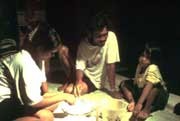 |
"I would rather starve to death than to be a robber."
 Said, Nina, 12 years old girl, living in a garbage dump in Payatas, Philippines, when I interviewed her.
Said, Nina, 12 years old girl, living in a garbage dump in Payatas, Philippines, when I interviewed her.
I first entered this garbage dump in January, 2000, after then, I made the documentary film "God's Children." which hit theatres in November, 2001.
Recently, a recovery program in Afghanistan has been highly discussed however, it is so hard to get rid of my mind that there are many children who were born and died in the Payatas dump.
Concerning social circumstances in Philippines, an unemployment rate of consenting adult in Manila shows more than 50 percent of the total population. Furthermore, illegal occupants called "squatters" are about 70 percent.
To tell the present situation, just the average collage-graduate girls can expect jobs like in first food stores.
Naturally, those children in the garbage dump stop going to school, because they know that they won't be able to find "respectable jobs" in the future.
 Besides, it can be said that if you live in the Payatas dump, that means all of the families (including relatives) live in there, because in Filipino culture, all the relatives and families are supposed to live together to help each others.
Besides, it can be said that if you live in the Payatas dump, that means all of the families (including relatives) live in there, because in Filipino culture, all the relatives and families are supposed to live together to help each others.
Talking about "every day life" in the Payatas dump, they wake up early in the morning at sunrise. They head towards many places wherever they like in the dump. After 4 to 5 hours, they have collected all the junks that are bottles, cans, brasses, iron compounds, e.t.c., and then, they go to the "junk shop" to sell those scraps. They earn 200 peso(=600 Japanese yen which deserves just about the average day pay of Filipino, which barely provides 3 meals a day for a family of 4 members.
However, I hear children's laughing all through day, and I have never begged for money by anyone.
One day, I met one girl who I became friend with, and I asked her this question.
"Are you happy now?"
She said, "Yes, I am. My parents, brothers, sisters, we all can live together, and we can eat 3 times a day. That's why I am happy."
I thought the reason why she felt this way was just because she has never lived and will never live outside the Payatas dump. It seemed that lived with the hardship
that she was living in the garbage dump, and never dreamed of being rich.
Right after start filming, everything has changed all at once.
One week after we started film shooting, June 10, 2000, there was a big falling in the Payatas garbage dump, 1000 people were buried alive.
And 5 days after, carrying in of garbage which is bread and butter for the people was stopped to avoid the second-falling.
 However, our camera kept on shooting "fight between life and death" there.
However, our camera kept on shooting "fight between life and death" there.
One of the principal cast in the movie, Nina couldn't earn money because she couldn't find any garbage. Then she said the first sentence in this note with her unclouded eyes "I would rather starve to death than be to be a robber." while eating only potato that she has been planting.
4 months after, carrying in of garbage finally started over again, which made them so happy.
"We don't want anything but Garbage!!"
And now, here in Tokyo, the film has just opened to the public!
As I heard that tourists and support groups had started visiting the Payatas dump, I have some sort of anxiety.
Are those children's clear eyes still clear?
Those children have always cared about their family more than themselves. In my opinion, such attitudes are so much beautiful as human beings. But, as the children in the Payatas dump get used to visitors, they might start having extravagant expectations.
I am little afraid if that more desire and expectation they have, the less they care about the family.
I am also afraid if their unclouded noble eyes will become dirty.
Are they still now happy? I sometimes talk to myself.
If we have enough money to eat 3 times a day, then we want medicines next, then start looking for school for your own children, and finally you'll come to want clean and sweet your own house. That's our nature as human beings, I think.
At the end of this note, I would say that we human beings are never happy until we "completely" are satisfied. Maybe, we are happier with less desire.
Hiroshi Shinomiya
2002.2
|
|